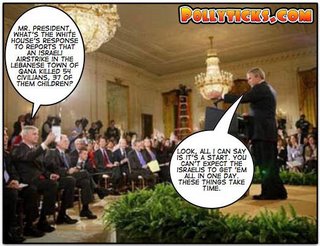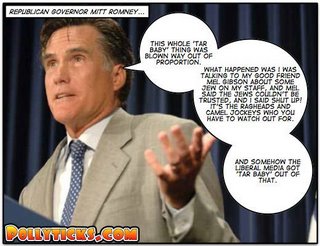Power Play
By Mickey Edwards
When political scientists in the future compile their lists of America's weak and strong presidents George W. Bush, whatever his other achievements or failings, will inevitably he judged among those who, for better or worse, thoroughly dominated the politics of the day. But despite what one may think of the president's various proposals, it is not Bush’s policies hut how he came to he so powerful that should most worry us.
The president has taken the nation into two significant wars, reshaped American tax policy, changed the fundamental premises of our security policies (and of our relationship to other nations, individually and collectively), vastly expanded the government's role in subsidizing health-care costs and dramatically changed the way many public school classes are taught.
It is also true that much of what this president has urged upon us has not come to pass, but in the end it is not merely the success or failure of individual initiatives that marks presidential strength hut whether the White House is central to, or peripheral to, the national debate. One of Bush's predecessors, Jimmy Carter, blamed the nation's then current problems on a sort of national malaise (a "crisis of confidence," he called it), as though the president of the United States were a mere observer rather than a partial shaper of events. President Bush's immediate predecessor, Bill Clinton, felt forced to insist the presidency was still relevant. The question with Bush is not whether the presidency is relevant hut whether any other part of the government is.
Presidential power ebbs and flows, of course, but it tends to flow in a fairly circumscribed way - for a short period after an election victory or in response to a special circumstance that affords a president greater than usual deference. But in time the honeymoon ends and traditional constraints on presidential power are renewed. That has not been the case with the current occupant of the White House.
Instead, the 21st century has seen the rise of a presidency that blatantly and deliberately ignores the law and openly defies and insults Congress. Actions by Congress are simply dismissed out of hand. When Congress set a requirement for court-ordered warrants before the government could eavesdrop on the private telephone conversations of American citizens, the White House simply ignored the requirement. When Congress attempted to prohibit the torture of U.S.-held prisoners, the administration answered, in effect, that it would take Congress's opinions into consideration and then decide for itself what to do. High-ranking administration officials have threatened reprisals against subordinates if they give Congress accurate information. Other administration officials, asked to answer a Senate committee's questions, have simply walked out of the room rather than comply.
Our current president likes to think of himself as "the decider;" as he made clear in responding recently to suggestions that Secretary of Defense Donald Rumsfeld resign or be fired. In the case of deciding whether to retain a particular cabinet member's service, he's right, of course. But in regard to obeying a congressional mandate - for example, to get a warrant before eavesdropping on American citizens - he's not. Bush was elected president, a constitutionally prescribed and circumscribed office, not the nation's decider in chief.
But sometimes it seems this president does indeed function as decider in chief, setting his own course and following it without much concern about possible objections from other government quarters. How has this happened?
Much of the current unease over presidential declarations of almost unlimited authority is focused on the clear overreaching of the president himself But presidents overreach; George W. Bush is not the first to do so. The list of previous presidential overreachers includes, among others, Thomas Jefferson, Harry Truman and Franklin Roosevelt. What makes this particular expansion of the imperial presidency more dangerous - and a far greater threat to our very system of government - is congressional acquiescence.
Our system of separated powers has devolved into an Americanized version of a European parliamentary system, in which the two major political parties have superseded the three branches of government and the constitutional separation of powers. Many members of Congress apparently no longer see themselves as constitutionally obligated to function as part of a completely separate and completely equal branch of government, charged with serving as the voice of the people, determining the laws, setting the priorities of the government and maintaining a check on the presidency. This is not a question of Congress's rights or its authority. It is a responsibility imposed by the Constitution. When a senator or representative takes an oath of office to support and defend the Constitution, he or she is also swearing to perform the duties assigned by the Constitution.
Those duties do not include serving as de facto members of the White House staff, but that is precisely how many members of Congress behaved until the president's poll numbers fell so precipitously. Despite occasional huffing and puffing, members of Congress have refused to use any of their many powers (subpoena, oversight, control over public spending) to enforce their decisions. This is a Congress in which the Senate majority leader was actually handpicked by the president. (Can one imagine Senator Bill Frist investigating the Bush Department of Defense the way Harry Truman investigated the Roosevelt War Department or the way J. William Fulbright investigated Lyndon Johnson's Vietnam policies?) Leaders in both the House and Senate have largely seen it as their function to enact the president's agenda rather than bring independent judgment to the issues of the day.
It was ironic to see members of Congress - including members of the president's own party express reservations about Bush's nomination of General Michael Hayden, the man who oversaw the National Security Agency's domestic spying operations, to head the CIA. The irony doubled days later when even more members of Congress - and more members of the president's party - became upset upon learning the NSA's spying operations had included gaining access to the phone records of millions of Americans. This was the Congress that had allowed the White House to forbid sharing information about this intelligence gathering with the full membership of the House and Senate intelligence committees and their staffs. This was the Congress that, upon learning of the NSAs eavesdropping, had not stepped in to enforce-with budget cuts and subpoenas-its insistence that the administration get court-issued warrants before doing domestic surveillance. Congress had, by its inaction, allowed to continue the very abuses about which it now complained.
This is an extremely dangerous period of presidential expansion precisely because of Congress's acquiescence and the fact that authority once ceded is almost impossible to retrieve. The more power the current Congress surrenders to the White House, the weaker future Congresses will be - and the stronger future presidents will be. The basis of American constitutional government - separation of powers, a system of checks and balances-will be lost, perhaps forever.
If the president of the United States is guilty of malfeasance – wrongdoing - by virtue of having ignored the Constitution, then Congress is equally guilty of nonfeasance - also a crime - for failure to perform its constitutional duties. The United States has survived presidential malfeasance before; congressional nonfeasance is a much more dangerous thing.



















